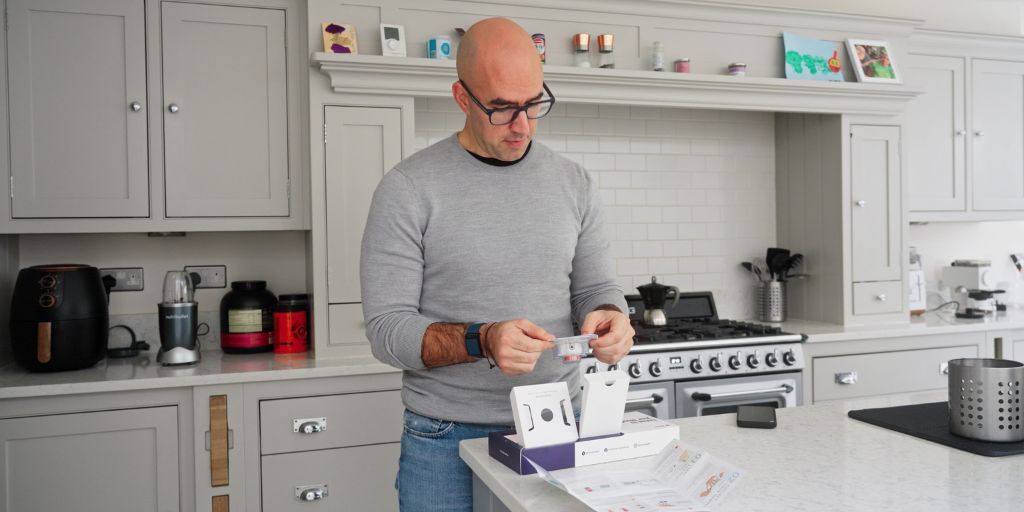
In a new survey of nearly 500 UK adults, 9 in 10 people changed their lifestyle and habits after taking an at-home blood test and receiving personalised clinical guidance. The survey, developed by UK health company Thriva, analysed 498 responses from its current users and focused on motivation and behaviours related to blood tests, health and lifestyle.
Although people are living longer, they now live an average of 20 years in poor health.7 Addressing this gap, known as a person’s healthspan, is important for maintaining a good quality of life, well into old age. The results show that after seeing their individual results, including vitamin, cholesterol or hormone levels, people make the following decisions:
- 90% made at least one lifestyle change
- 57% started new vitamins or supplements
- 56% made dietary changes such as eating more fruit and vegetables or cutting sugar
- 29% increased strength training
- 28% increased cardiovascular exercise
- 17% improved their sleep routines
- 10% adopted stress-management techniques like meditation
- Other reported changes included reducing alcohol intake, taking statins (supported by clinical expertise), or starting yoga and pilates
The study shows that 54% of respondents had never previously checked their blood for health monitoring before using at-home testing services. Cost, limited NHS eligibility and difficulty securing appointments were the main barriers.
Before using at-home blood tests, people’s main concerns were cost (44%), and uncertainty on administering the test themselves (31%). When asked if they received good value for the money spent on proactively managing health, people strongly agreed, with an average score of 72%.
Clinical validation, safety and regulation
Recent scientific evidence questioning the reliability of rapid home hea lth tests highlights the critical difference between unregulated point-of-care kits and clinically validated testing processed in accredited laboratories with full medical oversight.
Dr Vishal Shah, Chief Medical Officer at Thriva, says: “We don’t focus on rapid, one-off diagnostic tests. We support people to track key health metrics over time – such as HbA1c, LDL cholesterol and vitamin D – so they can spot trends early, make proactive changes, and monitor the impact. We back this up with robust clinical support – every result comes with a personalised GP report, tailored recommendations focused on sustainable lifestyle change, and the option to speak with a doctor.
“Our capillary blood samples are analysed in UKAS-accredited laboratories operating to ISO 15189:2022 standards – the same benchmark used across the NHS. Every part of our process is validated by our diagnostics partner Inuvi, including postal stability, biomarker comparability with venous blood, and overall clinical reliability. We welcome stronger regulation across the sector to ensure that all at-home testing meets the highest clinical standards.”
Preventative medicine through accessible health monitoring
As well as providing insights for improving health and lifestyle, regular at-home blood tests can reveal biomarkers and abnormalities that may indicate the early signs of diseases, including diabetes, cardiovascular disease and even some forms of cancer. Echoing the recent publication of the NHS 10-year plan, which put preventative health into the spotlight, this study shows that these themes are important to the public on an individual and population scale.
An increasing number of people are using at-home blood tests to monitor their health proactively, bypassing the traditional route of making a GP appointment and then receiving a referral. With better access to this type of testing, more people can test for markers of health and disease earlier, and make changes that have a longer-lasting impact.
Lucas Denton, GP and Clinical Governance Lead at Thriva, said: “As a GP, I often speak to people who just want clear, accessible answers about their health. Results arrive in their app with clear, expert guidance, helping them act straight away. When a simple home test shows that their cholesterol is high or their vitamin D is low, it can be the insight they need to make a change. That kind of information often prompts small but meaningful steps, such as swapping a biscuit for a piece of fruit or taking a lunchtime walk.
“These findings suggest that people aren’t just looking to understand their health; they’re ready to make positive lifestyle changes when supported with the right tools and appropriate medical information. At a time when chronic illnesses like type 2 diabetes, cardiovascular disease and some cancers are on the rise, this shift in mindset and behaviour is an encouraging sign. I hope we continue to see more people across the UK feeling empowered to take proactive steps towards better long-term health”.











